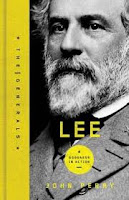 Biographies are generally very enjoyable reads for me; biographies of my heroes are even more enjoyable. The book Lee: a Life of Virtue, by John Perry, is one of the latter. I can honestly say that it is one of the best biographies I’ve ever read, if only for the life which it describes. As one of my heroes, Lee was a biography which I had been hoping to get my hands on.
Biographies are generally very enjoyable reads for me; biographies of my heroes are even more enjoyable. The book Lee: a Life of Virtue, by John Perry, is one of the latter. I can honestly say that it is one of the best biographies I’ve ever read, if only for the life which it describes. As one of my heroes, Lee was a biography which I had been hoping to get my hands on.
Many times, this somewhat enigmatic Confederate general is misnamed as endorsing slavery and being a cruel and merciless army commander. In truth, his life could be hardly farther from this. Ever since childhood, Lee was described as being gentle, and fully in control of himself. Since a young age he condemned slavery, and supported the gradual manumission of slaves.
The bulk of the book is concerned with Lee’s military career. For the first dozen years or so, Lee never saw active combat, but instead took a post in the Corps of Engineers. The Mexican War brought about his transfer into active duty, as Lee requested to be brought into the Army as an officer. During this war, he distinguished himself for his cool head, organized plans, and stellar performance in leading, and was soon promoted. By the eve of the Civil War, he was a Colonel.
Both sides later requested that Lee fight for them, both offering him a general-ship. Lee’s allegiance at first remained to the US, as his native state had not yet seceded. When Virginia seceded from the Union but did not at first join the Confederacy, Lee took command of the state militia, a daunting task which meant he basically had to create an army where there was none.
By the time Virginia joined the Confederacy, Lee worked for Jefferson Davis in securing Western Virginia, a task which he did not fulfill. By the end of that assignment, he was awarded command of the Army of Northern Virginia, despite criticism from the newspapers. By the end of the war, he would command the entire Confederate army, and perhaps better than any other man in the CSA represent the Rebel army.
After the war, Lee devoted himself to Washington College and his family, but his failing health kept him limited to what he could do. Despite the failure of the cause he had fought for, he still remained a beloved figure throughout the United States; particularly in the South. His name was mentioned as a candidate for president but Lee believed he was now ‘too tired,’ as he had come to the end of his strength. He died at home on the Washington College campus, in 1870.
This book was very well-written, and covered well the various aspects of Lee’s life. More than other documents I’ve read on Lee, this book focused on Lee’s character and personality, while still devoting important attention to his accomplishments on the battle-field. The book is well-written and captivating, though it helped that Lee is one of my personal heroes. I highly recommend Lee: a Life of Virtue to anyone interested in history, but also to someone looking to learn more about the Confederacy’s foremost military general during the Civil War.
Awesome review! Lee is one of my heroes as well, so I'll definitely have to read this one. Thanks!
ReplyDeleteThis is an excellent book, Corey. Lee is one of my biggest heroes, and reading this book was great. But I won't give my whole review again! ;)
ReplyDeleteAndrew